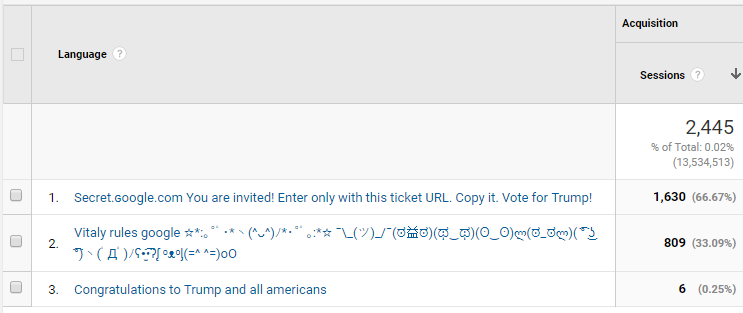
Written By:
Sean Henri
When it comes to becoming a more data-driven marketing team, web analytics tools like Google Analytics, Google Tag Manager, Kissmetrics, Mixpanel and Adobe Analytics often come to mind.
These tools can provide powerful insights into the effectiveness of your marketing campaigns, your audience, and what people are doing, or not doing, when they land on your website. But simply encouraging your team to dive into your Google Analytics data can lead to negative consequences if that data is inaccurate, misleading, or downright wrong.
Allowing your team to make decisions based on bad data can lead to two major problems:
- Your team stops trusting the accuracy of the data, leading to poor adoption of the tool.
- Your team doesn’t realize the data is bad, and makes major decisions based off inaccurate information.
But how can you tell if your data is trustworthy or not? A web analytics audit may be a great solution.
What is a Web Analytics Audit?
A web analytics audit is a comprehensive review of the quality of your data, the implementation of your tracking code, and the configuration of your tool.
Audits are often conducted by professional analytics consultants or agencies who are well equipped to identify both common and obscure issues that may be degrading the quality of your data, and who are able to efficiently guide you on the steps to resolve those issues.
Get A Complimentary Google Analytics Health Check
Wondering if there is a problem with your Google Analytics data? Find out with a free assessment from one of our experts.
But they can be expensive and time-consuming, which might lead you to put the project on the backburner, or consider tasking someone internally to learn how to conduct one themselves.
So should you hire a consultant to audit your web analytics data? Is it worth it? What should you reasonably expect to pay? Let’s take a look at some of the common considerations.
How to Know If You Need to Audit Your Web Analytics Data
It’s usually pretty easy to tell if there’s a problem. For example, let’s say that a member of your team shares a chart showing an increase in goal completions month-over-month, but you know from reviewing the data in your CRM that your volume of leads from the website actually went down.
Or, you’ve noticed a lot of funny data in your reports lately. For some reason (not set) is suddenly listed as a top landing page, and you’re noticing some spammy looking messages in another.

If your data is showing the tell-tale signs of a poor or broken implementation, it’s likely a good time for an audit and tune-up.
But degrading data quality shouldn’t be the only time you plan for an audit. You may want to make sure that you’re taking full advantage of the analytics tool, or that your team will have the data they need to analyze and extract meaningful insights from the data.
Common justifications for a web analytics audit include:
- When you’re planning on redesigning your website, and need to answer specific questions about your users and website content.
- When you’ve shifted your marketing strategy, and need to ensure the data you’re measuring is still aligned with your main objectives.
- When you want to be sure you’re taking advantage of the latest features and best practices.
How Much Does a Web Analytics Audit Typically Cost?
Our review of some of the top analytics consulting firms and experience in the market suggests that the average Google Analytics audit can cost from as low as $1,500 to as high as $35,000. At Pepperland, we’ll typically charge a flat fee of $5,000 for websites up to 2,000 pages. For smaller websites under 100 pages, we have an abbreviated version of the audit that costs $2,000.
Some consultants charge flat rates, and others charge hourly fees. When charged hourly, we’ve found that the typical rate is between $100–$150/hr, with more experienced firms charging as high as $375/hr.
There are many factors that may influence the cost, including:
- The size and complexity of your website
- How much of your website you would like to have audited
- The last time you improved your analytics implementation
- The experience and size of the firm conducting the audit
Is it worth it? That depends on your situation. If your average customer has a lifetime value more than $5,000, and you’re likely to gain at least a few more customers by improving your ability to analyze data, it should be an easy decision to make.
If you’re dealing with smaller numbers—say, if you’re a company smaller than 10 or the bulk of your sales aren’t originating online—you may be better off trying to fix things on your own first.
How to Think about Scope
As we mentioned above, a key factor in determining the cost of your website is the size and complexity of the website, and the amount of pages you would like to have audited.
Since Google Analytics is typically deployed site-wide, you may automatically assume that your audit should also be sitewide—but this isn’t always necessary.
If you have a large website—say 10,000 pages plus—with multiple sub-directories or sections of the website that appeal to different audiences or represent different departments or business units, it might be smart to limit the scope of your audit to a smaller subset of the site first.
Why?
The audit simply identifies the problems, and recommends action items that can be taken to resolve them. Acting on those recommendations is a very different thing, and often proves to be time-consuming and difficult when a website is on a larger side.
Bottlenecks can occur as you attempt to gain access to different CMS platforms, and gain buy in to make some of the changes recommended as a part of the audit. On top of this, the website is likely continuing to change, potentially leading to new issues that weren’t present at the time of the audit.
It’s better to be quick and nimble. As Google Analytics evangelist Avinash Kaushik once wrote when reflecting about the need for data quality, it’s better to “move fast and think smart” than it is to try to strive for perfectly clean data. If you have a large website, think about running an audit of the most important part of your website first. Once you have fixed any issues uncovered, re-assess, and determine if it’s necessary to audit additional sections of your website.
Your consultant is also going to know what property, and views, you wish to have audited. You’ll make everyone’s life easier and save some money if you have one or two properties and views in mind. Try to get a feel for which Google Analytics properties your team is leveraging the most before you go getting quotes and proposals.
What Happens after an Audit
Once your audit is complete, you’ll have a lengthy document outlining all of the issues with your data and the misconfigurations that should be fixed. You’ll also likely gain a checklist of best practices that you should consider implementing—things like how to structure your views and filters, and how to better maintain your analytics solution over the long run.
You’ll want to give all relevant stakeholders advance notice that you might need their help. You may need help chasing down credentials for Google Tag Manager, or help from your IT team or an external agency to make code changes to your website. Setting these expectations prior to the audit will help reduce the likelihood that the findings of your audit actually get acted on.
You should also remember that an analytics audit is not a measurement strategy. An audit is mostly an assessment of the status quo. It helps you ensure you have the best data possible given your current measurement strategy. If you think you’re measurement solution needs to be realigned with your business goals, or was never defined and documented in the first place, prepare to have that discussion following the audit, or prior to the audit if possible.
When all of the recommendations have been implemented, you should be able to feel confident in your data again. It’s time to brag about it! Showcase the improvements you made to your internal stakeholders and train them how they can extract insights from the data. This is key to getting a positive ROI on your analytics investment.
Is It Worth It?
If you’ve read this far, the answer is likely a yes. If you’re going to become a data-driven team, you want to make sure that data is driving you in the right direction. And if you’re taking the time to read a lengthy blog post about the pros and cons of a web analytics audit, you’re probably doubting the quality of your data.
You don’t have to decide on your own. We offer a free Google Analytics Health Check to help you determine the overall quality of your data, and whether or not it’s trustworthy enough for you and your team to make decisions from it. It’s a pain-free way to decide if a web analytics audit is right for you and your organization.
Have you gone through an analytics audit before? What did you find out about your data? Did your team make better decisions after the issues were resolved? Share you stories in the comments below!








